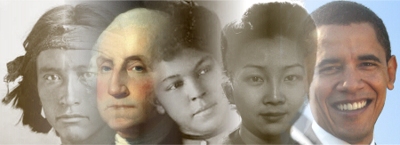Lucy Stone (1818-1893) was a teacher, speaker, women's rights advocate and abolitionist.
She kept her own name after marryng Henry Blackwell and refused to pay her property tax bill in 1858 because it was “taxation without representation.” She gave the following speech in October, 1855 at a women's rights convention in Cincinnati, Ohio.
"A Disappointed Woman"
From the first years to which my memory stretches, I have been a disappointed woman. When, with my brothers, I reached forth after the sources of knowledge, I was reproved with 'It isn't fit for you; it doesn't belong to women.' Then there was but one college in the world where women were admitted, and that was in Brazil. I would have found my way there, but by the time I was prepared to go, one was opened in the young State of Ohio—the first in the United States where women and negroes could enjoy opportunities with white men. I was disappointed when I came to seek a profession worthy an immortal being—every employment was closed to me, except those of the teacher, the seamstress, and the housekeeper. In education, in marriage, in religion, in everything, disappointment is the lot of woman. It shall be the business of my life to deepen this disappointment in every woman's heart until she bows down to it no longer. I wish that women, instead of being walking show-cases, instead of begging of their fathers and brothers the latest and gayest new bonnet, would ask of them their rights.
The question of Woman's Rights is a practical one. The notion has prevailed that it was only an ephemeral idea; that it was but women claiming the right to smoke cigars in the streets, and to frequent barrooms. Others have supposed it a question of comparative intellect; others still, of sphere. Too much has already been said and written about woman's sphere. Trace all the doctrines to their source and they will be found to have no basis except in the usages and prejudices of the age. This is seen in the fact that what is tolerated in woman in one country is not tolerated in another. In this country women may hold prayer-meetings, etc., but in Mohammedan countries it is written upon their mosques, 'Women and dogs, and other impure animals, are not permitted to enter.' Wendell Phillips says, 'The best and greatest thing one is capable of doing, that is his sphere.' I have confidence in the Father to believe that when He gives us the capacity to do anything He does not make a blunder. Leave women, then, to find their sphere. And do not tell us before we are born even, that our province is to cook dinners, darn stockings, and sew on buttons. We are told woman has all the rights she wants; and even women, I am ashamed to say, tell us so. They mistake the politeness of men for rights—seats while men stand in this hall to-night, and their adulations; but these are mere courtesies.
We want rights. The flour-merchant, the housebuilder, and the postman charge us no less on account of our sex; but when we endeavor to earn money to pay all these, then, indeed we find the difference. Man, if he have energy, may hew out for himself a path where no mortal has ever trod, held back by nothing but what is in himself; the world is all before him, where to choose; and we are glad for you, brothers, men, that it is so. But the same society that drives forth the young man, keeps woman at home—a dependent—working little cats on worsted, and little dogs on punctured paper; but if she goes heartily and bravely to give herself to some worthy purpose, she is out of her sphere and she loses caste. Women working in tailor-shops are paid one-third as much as men. Some one in Philadelphia has stated that women make fine shirts for twelve and a half cents apiece; that no woman can make more than nine a week, and the sum thus earned, after deducting rent, fuel, etc., leaves her just three and a half cents a day for bread. Is it a wonder that women are driven to prostitution? Female teachers in New York are paid fifty dollars a year, and for every such situation there are five hundred applicants. I know not what you believe of God, but I believe He gave yearnings and longings to be filled, and that He did not mean all our time should be devoted to feeding and clothing the body. The present condition of woman causes a horrible perversion of the marriage relation. It is asked of a lady, 'Has she married well?' 'Oh yes, her husband is rich.' Woman must marry for a home, and you men are the sufferers by this; for a woman who loathes you may marry you because you have the means to get money which she can not have. But when woman can enter the lists with you and make money for herself, she will marry you only for deep and earnest affection.
From:
The Penguin Book of Historic Speeches
Brian MacArthur, editor
Penguin Books, 1996
Return to Speeches

